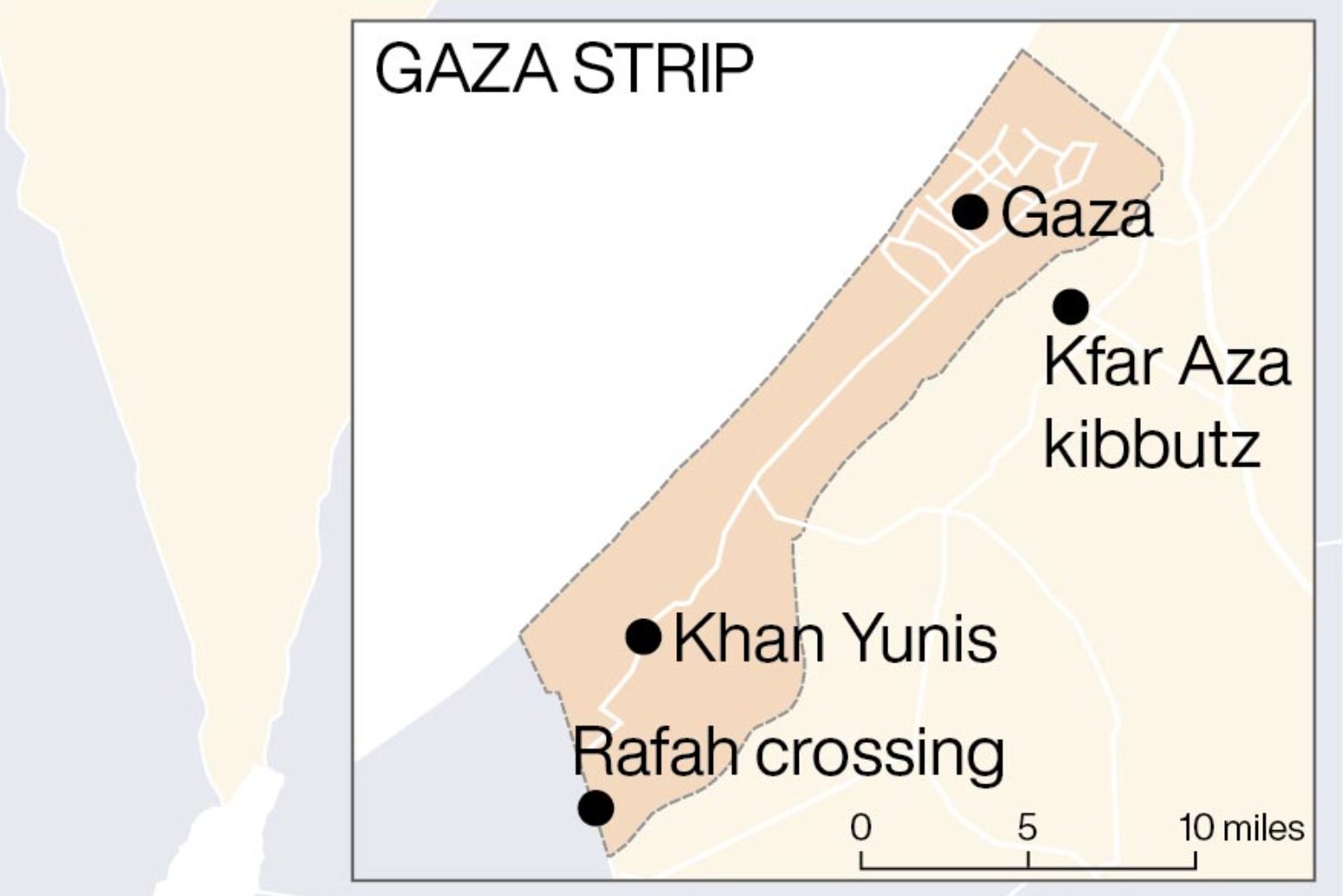
Humanitarian aid convoy crosses into Gaza Strip from Egypt
The border crossing between Egypt and Gaza has opened to let desperately needed aid flow to Palestinians.
Gaza’s 2.3 million Palestinians, half of whom have fled their homes, are rationing food and drinking filthy water. Hospitals say they are running low on medical supplies and fuel for emergency generators amid a territory-wide power blackout.
Israel has launched waves of airstrikes across the territory that have failed to stem ongoing Palestinian rocket fire into Israel.
The opening came after more than a week of high-level diplomacy by various mediators, including visits to the region by US President Joe Biden and UN Secretary-General Antonio Guterres.
Israel had insisted that nothing would enter Gaza until some 200 people captured by Hamas were freed, and the Palestinian side of the crossing had been shut down by Israeli airstrikes.
More than 200 trucks carrying roughly 3,000 tons of aid, which had been positioned near the crossing for days, began heading into Gaza. Hundreds of foreign passport holders also waited to cross from Gaza to Egypt to escape the conflict.
Aid workers on the Egyptian side of the crossing could be seen chanting and clapping as trucks passed through the main gate to Gaza.
The opening came hours after Hamas released an American woman and her teenage daughter, the first captives to be freed after the militant group’s October 7 incursion into Israel. It was not immediately clear if there was any connection between the two.
Hamas released Judith Raanan and her 17-year-old daughter, Natalie, on Friday for what it said were humanitarian reasons in an agreement with Qatar, a Persian Gulf nation that has often served as a Middle East mediator.
The two had been on a trip from their home in Chicago to Israel to celebrate Jewish holidays, the family said. They were in the kibbutz of Nahal Oz, near Gaza, when Hamas and other militants stormed into southern Israeli towns, killing hundreds and abducting 203 others.
Mr Biden spoke with the two freed hostages and their relatives. The International Committee of the Red Cross, which transported the freed Americans to Israel, said their release was “a sliver of hope”.
Hamas said in a statement that it was working with mediators “to close the case” of hostages if security circumstances permit. The group said it is committed to mediation efforts by Egypt, Qatar and others.
There are growing expectations of a ground offensive that Israel says would be aimed at rooting out Hamas, an Islamic militant group that has ruled Gaza for 16 years.
Israel said on Friday it does not plan to take long-term control over the small but densely-populated Palestinian territory.
Israel has also traded fire along its northern border with Lebanon’s Hezbollah militant group, raising concerns about a second front opening up.
The Israeli military said on Saturday it struck Hezbollah targets in Lebanon in response to recent rocket launches and attacks with anti-tank missiles.
A potential Israeli ground assault is likely to lead to a dramatic escalation in casualties on both sides in urban fighting. More than 1,400 people in Israel have been killed in the war — mostly civilians slain during the Hamas incursion.
Palestinian militants have continued to launch unrelenting rocket attacks into Israel — more than 6,900 projectiles since October 7, according to Israel.
More than 4,100 people have been killed in Gaza, according to the Health Ministry run by Hamas. That includes a disputed number of people who died in a hospital explosion earlier this week.
Speaking on Friday about Israel’s long-term plans for Gaza, Defence Minister Yoav Gallant laid out a three-stage plan that seemed to suggest Israel did not intend to reoccupy the territory it left in 2005.
First, Israeli airstrikes and “manoeuvering” — a presumed reference to a ground attack — would aim to root out Hamas. Next will come a lower intensity fight to defeat remaining pockets of resistance. And, finally, a new “security regime” will be created in Gaza along with “the removal of Israel’s responsibility for life in the Gaza Strip”, Mr Gallant said.
Mr Gallant did not say who Israel expected to run Gaza if Hamas is toppled or what the new security regime would entail.
Israel occupied Gaza from 1967 until 2005, when it pulled up settlements and withdrew soldiers. Two years later, Hamas took over. Some Israelis blame the withdrawal from Gaza for the five wars and countless smaller exchanges of fire since then.
More than a million people have been displaced in Gaza. Many heeded Israel’s orders to evacuate from north to south within the sealed-off enclave on the coast of the Mediterranean Sea.
But Israel has continued to bomb areas in southern Gaza where Palestinians had been told to seek safety, and some appear to be going back to the north because of bombings and difficult living conditions in the south.
Generators in Shifa Hospital, Gaza’s largest, were operating at the lowest setting to conserve fuel while providing power to vital departments such as intensive care, hospital director Mohammed Abu Selmia said. Others worked in darkness.
The lack of medical supplies and water make it difficult to treat the mass of victims from the Israeli strikes, he said.
The Palestine Red Crescent Society said it had received a threat from the Israeli military to bomb Al-Quds Hospital. It said Israel has demanded the immediate evacuation of the Gaza City hospital, which has more than 400 patients and thousands of displaced civilians who sought refuge on its grounds, it said.
It was not clear if there was an agreement for generator fuel to be brought in through Rafah.
Published: by Radio NewsHub